#but its so much more rooted in like. who he is and his personal arc and how he can grow and just a lot of relation there
Text
I actually do have the words to describe how much I love Max but it’d be just a rambly mess.
#its not even as much hes attractive which i mean he IS man can get those dilf vibes#but its so much more rooted in like. who he is and his personal arc and how he can grow and just a lot of relation there#the end card that talks about him being at peace just kills me every single time#hes an angry man with a hell of a temper who pours himself into religious shit because he thought that would give him any#sort of peace but it doesnt and hes pissed of. which is such a basic explanation of all hes got going on but shh#at the end of his personal quest he can basically just come to the realization that the religious stuff isnt real. there is no large grand#plan. and hes at peace with that. i like that he tries to chill tf out now#after that he like in his own words hes still kind of an asshole but he KNOWS hes an asshole and to me thats a step in the right direction#i just see characters with short fuses who have the ability to grow and be seen as the good people they are and i get emotional#for reasons of relatable
1 note
·
View note
Text
Near Uniquely RWBY - Main Characters
I was chatting with my sibling the other day and we were joking about the fact in 90% of the media I consume I generally don't like the main characters.
Not in the sense I necessarily hate them, but I generally don't find them to be the most interesting, engaging or enjoyable person on screen or page. Instead I tend to gravitate towards secondary or minor characters and even minor antagonists before any of the big names.
Some of this is rooted in my often rooting for what tends to feel more like a real underdog or characters that feel like they got dealt a bad hand by the author unfairly. But its also that in a lot of media the main characters tend to immediately, slowly or quickly go into personality lockdown.
Becoming less a personality and more the embodiment of expected tropes and themes, or they lose their unique edge or circumstances because the plot demands one benefits or personality changes be heaped on them to keep the tone and story going.
Some examples of this would include say:
Ichigo from Bleach, with him and his supporting cast being very unique and super interesting during the initial arc. But as Soul Society came in, he became a much more standard Shounen determinator a the expense of his personality and his supporting casts were largely watered down & left behind.
Or how in Naruto or Dragon Ball the whole underdog/hard worker aspect of the characters felt undercut by legacy power ups and an endless wellspring of natural talent, alien biology, ETC.
I know these are just two examples, but they cover the general gist of what I mean.
So, what makes RWBY different?
Well, off the cuff, is simply that the four main characters are women.
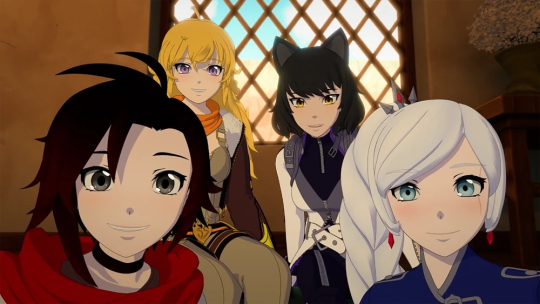
I've often felt simply putting anyone other than a cis-het guy into the main character slot of say, a battle Shounen, or Isekai stands a good chance of making it more interesting by default. Even if the author does nothing with it the audience reaction would be different because the MC would be an exception to the norms.
In that vein, while one can call RWBY some sort of Shounen or adventure fantasy or magical girl show the main four are unique in how they manifest on screen at the very start. From how they participate in action, to how said action is structured and framed and the kind of adventures and topics they tackle.
But being unique alone is not enough, that would simply make it more interesting than the bog standard but what elevates RWBY is the execution and exploration of such elements and its characters.
Going into every aspect would be difficult, but in light of what I said above would be how each of the main four are initially presented as familiar archetypes, only to subvert or deconstruct them.
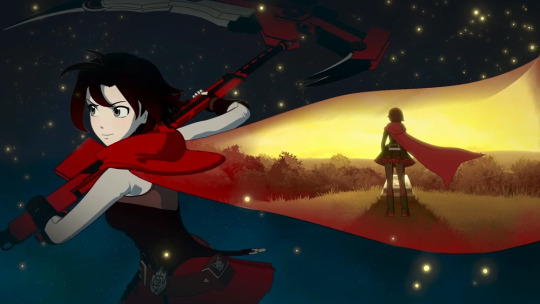
Ruby is a peppy goth who just wants to be normal but has inborn powers from her mysteriously vanished mother and serves as a beacon of optimism to others.
Except Ruby's version of normal still involved fighting death monsters with a sniper rifle scythe and she is actually one of the more ruthless characters. Her peppy persona obscures that she can have a pretty vicious temper when pushed and has displayed strong bloodknight tendencies.
Her unrelenting optimism and desire to fix the world is a complex mix of true beliefs, coping mechanism for trauma and her grappling with positions forced on her against her will. Her inborn power is potentially useful but also not that much of a game breaker outside specific contexts & said power sure as hell didn't save her mom.
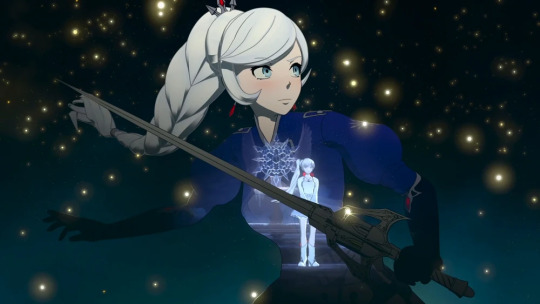
Weiss Schnee is the Tsundere heiress of a powerful family, with a haughty attitude that hides her loneliness.
Except the "Tsundere" is more of a defense mechanism born of coming from an abusive home where every member of her family manifested a different trauma response. Freeze (Mother), flight (Sister), Fight (Weiss) Fawn (Brother).
Despite her upbringing & some projected trauma, she's far from ignorant as to the worst excesses of her nation early on, and her journey was more about overcoming the impacts her abuser had on her and finding a family in her team that let her be safe enough to let down her walls. Also despite being "The ice queen" she's actually one of the characters least inclined towards more ruthless actions and is extremely empathic.
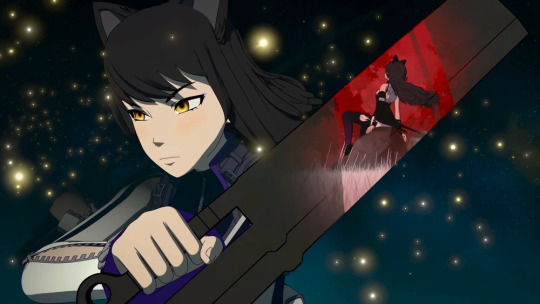
Blake Belladonna is a mysterious and silent rougish woman, something of a shrinking violet even, but she carries with her a wounded heart thanks to her old flame, the edgy Adam Taurus.
Or more accurately, Blake is the daughter of activists and politicians who represent the worlds main discriminated against minority. She spent her youth on the road as a protestor and where even her father could be nearly killed by a lynch mob. She was targeted & groomed by a man who claimed to want to fight the same injustice she did but who was only interested in using the movement to grow his own power.
Her initial aloof-ness was a trauma response to having spent years under his thumb and overcoming him and the idea she had to 'save' him was one of the main corner stone so her character. Also, despite the "Revolutionary fighter" backstory she like Weiss is much less inclined towards ruthlessness than her team in large part because her past experience with it.

Yang Xiao Long, introduced as the fun loving big sister of Ruby & boisterous bruiser of the team who loves to party & flirt.
Except no, Yang was parentified as a child and forced to raise her own sister as their family unit fell apart. Her "Party girl" persona was outright framed as judging a book by its cover in her own trailer and something she put on or took off as she needed.
She became disabled over the course of the series run as well as entered a Sapphic romance with her partner Blake. Unlike the stereotype of characters with her design, Yang is actually an excellent student, fighter and engineer/mechanic. Plus much like her sister she tends to be of the more ruthless and pragmatic persuasion despite being from the "Normal" background.
Character Conclusion
So, all the characters break out of their initial archetypes, which already makes them more interesting. What's more, these sorts of characters just being oput together and made the main characters rather than circling a dude is in of itself unique.
But there are other aspects of the writing which endear me to how it handles the main characters and what keeps them interesting.

Anger & Violence
See, while in various media women do express anger at times it is still often far less so than men. What's more, often women's anger tends to be presented in... Less flattering lights.
With the anger obscuring fragility while in a man it conveys strength. Or implying a sort of hysteria rather than an appropriate or controlled response. Or worst of all being demonized in general unless its rooted in or coming from traditionally feminine places.
The same tends to be true when it comes to violence with a lot of media either trying to find some way to make women in battle less... Brutal than their male counterparts. (More more like fanservice) Along with rarely letting women fight men, unless they are a special exception to the norm.
RWBY does not do this.
The main characters, hell, all the women in the series express a multitude of different forms of anger and violence. They battle men, they battle each other, they battle monsters all with no distinction nor fanservice shot in sight.
What's more though is that said anger and violence are not presented as, for lack of better words, wrong. The writers don't draw overt attention to this fact, they don't hang a big sign up saying "Girls can fight & shout too" or the like.
They just present these women with a range of emotions, motives and actions that are treated according to what fits the theme of the show rather than hewing closer to gendered lines.
This isn't to say anger & violence are lionized, but more that the experience and usage of them is not demonized or undermined because of the characters gender.
I suppose what I am saying is that CRWBY by and large lack double standards when it comes to exploring these things that I see so often in other media. The women in the main cast, among the villains, both sides respective allies and beyond can be flawed, or angry or do both good and terrible things.
But the writers are always treating everyone's pain as equally valid regardless of gender or situation. Which means that the situations that cause anger exist within a tone of respect that forms the depiction and framing of anger itself.
Which is just something I really enjoy.
Thanks for reading!
#RWBY#Save RWBY#greenlight volume 10#Team RWBY#ruby rose#weiss schnee#blake belladonna#yang xiao long#Some other series that do this or touch on it are She-Ra#The original Sailor V manga but less so Sailor Moon#& to varying degrees the Owl House#Thanks to Adam for helping me with the conclusion!
235 notes
·
View notes
Text
The Problems With Charlie As The Main Protagonist
I've spoken about my thoughts on Charlie as a character before a few times on this blog, but I think it's finally time to discuss why Charlie isn't exactly the best protagonist. On the surface, there doesn't seem to be much wrong with her, she's likable and endearing enough and she's easy to root for. But...once you look deeper, the problems begin to rear their ugly head.
1. Charlie Never Grows
The first major issue with Charlie as a character is how she never really grows over the course of the first season. The show never really gives her much of an arc...? Like, by the end of the season, what does Charlie really learn by the end? The only thing I can think of is that she was right about sinners being redeemed and...that's it.
And it doesn't really make Charlie that particularly compelling as a character, she's entirely stagnant. She does have a conflict with her father, which, while executed fine, isn't enough to make her a developed character. She only gets small tinges of development and that isn't really enough for me.
Charlie doesn't learn anything or grow as a character, which makes her pretty underdeveloped as a character. The show never really gives her any real character flaws to grow from and become a better person, she's always portrayed as in the right anyway and never challenged once. Speaking of that...
2. Charlie is Always Right
This more or less ties back into the "Charlie never grows" point I've said before and I've talked about this several times before, but it's still an issue with Charlie's character; she is ALWAYS in the right. Charlie's "everyone can be redeemed" mentality is never once challenged by the narrative, and anybody who does oppose Charlie in any way is considered as wrong by the narrative.
The reason why this is a problem is because Hazbin Hotel heavily preaches about being against black-and-white moralities, as seen with Heaven and especially Adam. Heaven is meant to be seen as bad because of its black-and-white mindset of "Sinners can't be redeemed and never will". This is put on full display with Adam, and his song Hell is Forever, to the point it literally includes lyrics like "the rules are black and white there's no use in trying to fight it".
You Didn't Know further pushes this with this line "the rules are shades of gray when you don't do as you say and you make the wretched suffer just to kill them again".
So the show wants to push a message of "black and white morals are bad", but...it's rendered moot by the fact that Charlie is purely portrayed as in the right. Charlie is completely correct, everybody can be redeemed, everyone even the most evil people who did the worst possible things can still be good, and anyone who opposes her is wrong cuz she's completely in the right...gee, for a show so heavily against black-and-white moralities...doesn't this all seem very black and white in it of itself?
Charlie's "everyone can be redeemed" mentality is just as black and white as Adam's "nobody can be redeemed", they are both extremes leaning in opposite directions, that are also both wrong in their own ways, yet the show portrays Charlie's extreme as the right one and Adam's as the wrong one.
I've already talked about this before but Adam is a pure straw character; he only exists so Charlie can prove him wrong, he cant have any real character depth beyond being a generic asshole or have a real point because the show is so dead-set on making Charlie purely in the right no matter what; the narrative never challenges her and anyone who opposes her is portrayed as automatically in the wrong.
This is not the only time this happens btw. In episode 5, Lucifer is also portrayed as automatically wrong for opposing his daughter’s goals. He himself says that “Our people are AWFUL. They got gifted free will and look what they did with it!”, and the show…never counters this, despite what Lucifer is saying…being true.
The people in Hell ARE awful and it's their own fault, many of them ARE deserving of death because…well, their shitty people.
Charlie is never challenged once throughout the show and its a problem because not only does it fly in the face of the show being so anti black and white, it also wastes an opportunity for the show to develop Charlie as a character; with her learning that some people can't be redeemed because they either are incapable or uninterested in changing.
That would fit more with the show’s anti-black-and-white themes and also have Charlie go through real growth as a character as she learns that not everything is all sunshine and rainbows. But sadly, we can't really have that.
So Charlie's ideals are never challenged by the narrative and thus it not only flies in the face of the show's themes it also wastes an opportunity for Charlie to grow as a character. Now it's best to get into the next issue with her...
3. Charlie is Barely Focused On
Another big issue with Charlie as the show's main protagonist is that the show doesn't really focus on her that much, especially the first half. Now, shows don't need to focus on the main protagonist at all times, obviously giving some screen time to other characters is definitely something shows should do.
But the problem is that Charlie gets very LITTLE focus in the series despite being the main protagonist, and this contributes to the problem of her being underdeveloped. The first half of the show is especially bad at this; episode 1 Is the only episode in the first half that focuses on Charlie, but even then it's overtaken by the B-plot involving the other characters trying to film a commercial.
Episodes 2&3 are entirely dedicated to what characters like Alastor or Angel Dust are doing and episode 4 is completely focused on Angel and his arc. It contributes to the issue of the show not being able to develop Charlie that much as a character because she's constantly being overshadowed by other characters. The second half is better in this regard for focusing more on Charlie but still, for the first half of the show, it feels like Charlie is overshadowed by other characters which is embarrassing because, well, she's the main character, yet she feels like she's barely gotten any actual spotlight.
4. Conclusion
I want to love Charlie as a character. I really do. I mean, she's a part of one of my favorite character archetypes. I always LOVE over joyful optimistic characters because I just find them a joy to watch on screen, but sadly, Charlie doesn't have much depth beyond that archetype. She isn't that developed making her fail to be much of a compelling protagonist, her ideology is never challenged by the narrative wasting an opportunity for her to grow and contradicting the show's themes, and she's heavily overshadowed by other characters despite being the main protagonist.
So ya, that's why Charlie isn't that great of a protagonist...bye.
144 notes
·
View notes
Text
okay, here’s my actual thoughtful post: I get why people are upset about the finale…I really do. but I want to mention that there’s a bigger picture to this story that’s missing if you’re zooming too close onto Izzy as a character, and I’m honestly so grateful that the show stuck to the thematic arc it introduced in season 1 because, as per usual, it’s about the themes 🤌 and this show never skimps on the symbolism!!
so here’s the thing: the primary themes are toxic masculinity (& it’s opposite, queer joy); trauma; love as a healing force for the above; and, title alert—DEATH. because it’s so much more than a cool title!
now, Izzy has always represented something metaphorical about all of these points; most directly, he’s always represented masculinity, and s2 has been an arc of toxicity deconstruction. but crucially, he’s also represented all that for Ed, who is the deuteragonist of this show. because—don’t forget—Stede and Ed are the show.
I’ve always doubted myself for feeling this after seeing how fandom saw Izzy as a third romantic figure (which like by all means have a blast in your fanfics I don’t care it’s about joy at the end of the day and pursue that as you want to), but after hearing something about djenks referring to Izzy as a father figure, it confirms a major point for me—Izzy is also in a lot of ways a parallel to Ed’s dad, and a representation of the trauma and guilt Ed felt from that formative killing. for so long, Izzy was an aggressive shadow in Ed’s life, and a tangible reminder of those daddy issues—someone telling him what to do, keeping him Blackbeard—and the beautiful thing is how that changed this season, how Izzy became a version of masculinity that could love and be beautiful and make good from the hurt, the literal poison into positivity. someone antithetical to his own paternalistic force, healing our daddy issues one drag show at a time. BUT, Izzy is still thematically representative within Ed’s arc—and by also representing the trauma that made Ed “Blackbeard,” it does make smart writing sense as to why Izzy died (NOT saying you can’t be sad about it—stick with me for a moment).
because here’s the thing—as aforementioned, this show is also about DEATH. killing is the root of everyone’s trauma, and reconciling a relationship with death is the ultimate arc Ed and Stede are both on, with the ultimate path of learning to live despite its inevitability. there’s a reason it was such a huge thing that Ed couldn’t personally kill, and then in this episode killed so many people with his bare hands in the name of love—and there’s a reason that was framed as a good thing. and there’s also Ed’s (and arguably Stede’s) active suicidality, which has been a huge force driving this season. these are characters who see death as this all-consuming thing, and they see their own deaths as the only solution. death is the traumatic force driving almost everything about their being for so long—and its reconciliation is everything for them, the greatest sign of growth. so Izzy’s death, and everyone beginning again with love—healing each other with love—is a cap to it all. it’s death as a positive force, for once. it’s death as love, not trauma. it’s death as something that will always happen, but this time not forced by your own hand. it’s a death to everything toxic, to what “Blackbeard” represented, and all the while a sort of rebirth. it’s kind of a death to…death? it’s functionally like the real physical moon replacing the giant romantic imaginary orb: it’s taking the thing that’s been artificially morphed in Stede and Ed’s heads and making it real this time, with all the bittersweet emotions that come with tangible reality.
and honestly, I’m glad that it was tragic and emotional. I didn’t think I’d be so devastated to see Izzy die, but it really did get to me, especially because of everything he said to Ricky and then to Ed. but think of it this way: Izzy and Ed might be romantically compelling because they were toxic and charged (and I hope people still enjoy everything they get from that dynamic in fan work), but imagine if the show had actually gone in that direction—where would it take us thematically? it would kill the thesis; it would be love as chaos and entertainment, but not healing. instead, this show gave us something so much more powerful: a legitimate, fully-fleshed trauma arc.
trauma hurts. Izzy’s death hurts. but that’s okay. that’s great, actually! it means the storytelling was effective—that Izzy’s arc made you feel something. and i know this won’t be every viewer’s experience, but honestly? I’m glad I can have this grieving process in such a beautifully framed light in the safe space ship of this show, because let’s be real—death, real life death, fucks you up. and let me tell you, I could’ve used this show during so many episodes of grief in my life. but here it is now, reminding us that our grief and trauma doesn’t define us—and WHAT a powerful thing for queer love, especially, to be presented as the thing that heals us all. ESPECIALLY when so much grief and death in this community is woven so deeply with the trauma of our identity.
so grieve as you need to, but don’t forget to turn the poison into positivity 💛 because that’s what the show is telling us—choose live, despite!
#djenks out here paying my therapy bill yet again#I feel like I need a million disclaimers for this post so just assume I’ve said all of them#and remember that art that hurts isn’t always a bad thing!#I didn’t think I’d have coherent thoughts yet I swear I blacked out and wrote this here we are#ofmd#ofmd season 2#ofmd s2 spoilers#ofmd spoilers#our flag means death#ofmd meta#tw: death#death#tw: suicide#suicide
277 notes
·
View notes
Text
I hate both the ways fannon (and now cannon) is slowly beginning to present the Al Ghuls.
On one hand you have the people who make Ra’s and Talia almost cartoonishly evil. Which is annoying because it does a disservice to both their characters, is usually rooted in very racist stereotypes and is also used to present Damian’s family as two conflicting sides. You’ve got his evil, horrible, no good Al Ghul family roots and then his perfect, holier than thou batfamily side.
Its especially annoying because in recent comics the batfamily hasn’t been treating him much better. With the amount of times he’s just up and left on secret missions you think they’d be taking care of the literal 14 year old. It’s just so dumb and incredibly one dimensional.
Then on the other hand you have people who absolve them of all guilt. Although I love good Grandfather Ra’s Al Ghul and good mom Talia it’s still not entirely accurate. I prefer it to making them just unrealistically evil, but you can like these characters and still accept that Damian was abused by them.
Ik Dc struggled with media literacy, but despite how it’s presented online abusive situations are not nearly as cut and dry as shown on TV. It’s not always ‘oh my dad beats me every day and I hate him’. Sometimes parents love their kids despite being bad for them, sometimes kids love their parents despite the way they’re treated. Sometimes these situations resolve themselves and sometimes they don’t.
I’ve always seen Damian’s relationship with Ra’s and Talia as complex and maybe I’m projecting a little, but I love the comics that take on a more nuanced perspective of the way he grew up. Personally my headcanon is that while Ra’s and Talia were both bad when Damian was growing up, giving him to Bruce kind of opened their eyes to the realisation that if they didn’t treat him better he was going to leave which kickstarts both the redemption arc and improving their relationship.
And ik it’s a bit beyond Dc, but I really hope they’ll drop the racist attitude towards the Al Ghuls. Tim stans too cause honestly the ‘Ra’s is obsessed with this pathetic little white boy’ is actually so problematic, but that’s a whole other conversation.
#batfam#damian wayne#dc comics#al ghul family#talia al ghul#ra’s al ghul#bruce wayne#Batman#Robin#dc
91 notes
·
View notes
Text
one of the many issues i find with sjms writing (and subsequently her fans) is that a character has to be perfect to be loved (this is acotar specific) hear me out ((apologies in advance for the somewhat rambling and nonsensical bits. its late lmao)
Just about everything Feyre and Rhysand do is justified. Rhysands entire list of evil actions from acotar is retconned. Him murdering those winter court children was suddenly by an unnamed daemati whos never brought up again, his sexual assault of feyre was “for her protection”, and in general the way he treated her UtM is okayed (sa is never justifiable, even in fictional media) and him keeping very important information about Feyres body from her is fine because he was doing it to spare her feelings (also never ok to keep information of ones body from the individual)
Feyre is allowed to destroy the spring court. No matter how you feel about Tamlins character the actions she took were extreme, petty, and useless. She collectively punished the citizens of the spring court because of her relationship with Tamlin and she believed him to be allying with Hybern. Which was hinted to her to be false and she could have read his mind at any point. Feyre also is a unreliable narrator but her word is taken as truth. When she has magical outbursts its nothing, she can treat her supposed friends like shit but shes still the better friend.
Together they constantly spout how perfect the other is. Especially Feyre about Rhysand, maybe its the mating bond but the bond is how sjm communicates her feelings about the characters (which i feel is evident in the Nessian bond) Feyre says rhysand is Good and Justified in everything he does, so you the reader must believe it too, right?
The rest of the Inner Circle also falls into this. Mor is allowed to unfairly treat Nesta like shit, Cassian is unquestioned when it comes to his mistreatment of his mate, azriel is a background tapestry, and amren is a whole different issue tbh.
Nesta is the outlier. She is not perfect and we know it because of how mistreated she is by the people that surround her. Cassian is a horrible partner, letting rhysand do and say what he wants to her, restricting her food and being very neglectful of Nestas mental health. Nesta is a flawed character but shes not an antagonist. Her flaws does not call for this sort of treatment. It is disgusting how sjm portrays Nestas character and her “healing arc”. Sjm says she loves nesta, but her treatment says otherwise.
Tamlin receives the brunt of this treatment. He is a flawed character but is not evil. Hes not even a real antagonist, just because he is not friends or on good terms with Feyre and Rhysand does not make him such. His allying with Hybern is used as reasoning for his mistreatment when its clear as day hes a double agent. Tamlin, while he struggles with emotional regulation, anger issues and communication is a very good high lord and his personal relationship with a character does not change that. His actions towards feyre are often called abusive but sjms writing fails to bring this observation to fruition. She fails to actually make him abusive and antagonistic because she accidentally writes her own outs by justifying similar behaviors from other characters.
If you have spent anytime on the majority side of the fandom you have seen the Feyre and Rhysand vs Nesta and Tamlin mentality. Nesta and Tamlin are hated while Feysand are treasured and its because sjm makes a perfect character for you to love so why would you root for the flawed characters hated by the narrative? Nesta and Tamlin are far more nuanced and interesting due to their imperfections, dislike by the narrative, and hatred from the majority fandom. (To note, Nesta and Tamlins characters are different ((although they have some striking similarities)) but their treatment is very equal. Which is why i, and many other people in the fandom compare and combine them so much)
Feyre and Rhysand through the narrative and fans are perfect and can do no wrong. Tamlin and Nesta are frankly evil and undeserving of love. Its intriguing to see this behavior and its almost unique to the acotar and booktok fandom. Which is why i find myself so focused on Tamlin and subsequently the fandom. its so odd and something i havent seen before that it gets stuck in my little adhd brain.
#acotar#pro tamlin#tamlin#a court of thorns and roses#sarah j maas#anti rhysand#sjm critical#anti feysand#anti nessian#pro nesta#Arson yaps#Its late. can you tell?#i was eating my 1am cereal and the thought came to me#i may polish this more in the morning since its a bit rambling#anyway i love my cancelled wives#this is tagged anti rhysand and anti feyre so i better not see any of yall bitches here#this is for the girls who get it (girls gender neutral ofc)#I will definitely expand on this thought while working on my deep dive analysis#theres a point in here i swear
108 notes
·
View notes
Text
something that is very interesting rereading early MTMTE is that the comic is actually very much written with the assumption a ton of its readership are specifically pre-existing IDW comics readers, which can sometimes be difficult to remember because of the fact that a lot of people wound up coming onboard to MTMTE from outside the fandom in the end and now it has a reputation as an entry point as a result. this manifests in a couple ways throughout the first couple major arcs. one obvious one is that the Overlord stuff functionally makes it a sequel of sorts to Last Stand of the Wreckers, at a time no direct sequel was planned. but my favourite is that there's a kind of narrative trick the comic pulls with the leadup to the payoff Remain in Light gives us for Magnus.
the Magnus we get in early MTMTE is not the Magnus we get in earlier IDW comics. he's very exaggerated; where phase one Magnus is a by-the-books stickler for not so much as bending rules and someone we see struggling to maintain that sense of moral uprightness in the face of the war and the people around him being far less dedicated to staying on the straight and narrow like him, it's completely turned up to eleven in early MTMTE. phase one Magnus would not be doing endless doorframe audits, or throwing people in the literal brig for crooked badges. but this doesn't necessarily register as a change in character so much as a change in genre. MTMTE is also a dramedy with heavy emphasis on the comedy side of that in a way no other IDW comic is, and the shift in Magnus' characterisation therefore feels like 'well in THIS genre, that's what that archetype is like', rather than a diagetic shift in character. even if you come to MTMTE straight off those prior comics, it is very much a 'roll with the genre shift' thing rather than a 'hm. Magnus is acting… weird' thing. you let it go.
there are a couple indications this might not be the case early on. Rodimus especially seems to be under the impression that Magnus is acting uptight even for him, with his insistence on waving it off like 'he needs to relax, Swerve can you get him to chill on Hedonia because my guy is REAL stressed' and the like. (this makes sense- Rodimus is the person on the ship who has actually been directly interacting with Magnus regularly pre-MTMTE.) but it's not super obvious and not heavily emphasised.
which makes the eventual post-Overlord and RiL reveal, which is that Magnus has in fact been acting weird because he's having a breakdown that has largely gone unremarked upon by his shipmates, really really good. Magnus has not been doing doorframe audits because he's the comically uptight second in command acting as straight man for genre purposes; Magnus has been sending Rodimus a million memos a day and losing his shit over nothing because as someone whose entire identity as 'Magnus' is rooted in a wartime role he escaped into, he's been having an existential crisis now the war is over and he has no purpose and doesn't know what to do because he never expected to have to play that part in peacetime. the entire time the genre shift was somewhat obfuscating the fact this characterisation was a thing that is in-universe relevant, which also then reflects back on the fact Rodimus is like. hm. probably should have noticed that, now I feel like an asshole for not realising. (the scene where he and Rung discuss those unread memos, post-Overlord.)
it's a small thing, but it's a really effective misdirect for the payoff Magnus gets in RiL that reads a hell of a lot more clearly on reread and rewards that chance to revisit the early issues with that knowledge. of course that wasn't just a gag, of course he's actually slowly losing his shit slightly, he cannot go five seconds without making it clear he is Stressed As Hell. but until you get to that actual reveal, there's just enough room for the comic to let a reader assume it's, you know, we're in a comedy now, we need a hilarious straight man, and Magnus is it. it's great! all the stuff MTMTE pulls to simultaneously obfuscate the Magnus/Minimus reveal while also making it feel completely reasonable on reread is great. really good use of reader bias there.
93 notes
·
View notes
Text
Japanese QL Corner
I've been really loving this run we're on with these two shows, I'm always in a good mood after watching them. These are on Gaga and I highly recommend watching.
At 25:00 in Akasaka
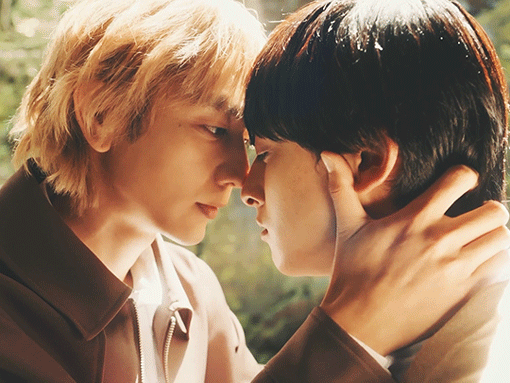
Shirasaki noooooooooooooo! We were getting so close to a breakthrough for our guy but of course he just had to get a blow to his confidence right when he was gearing up to confess. And of course he doesn’t have the confidence to realize the person Hayama can’t get over is him, so now he finally understands what it means to be heartbroken. I really love the way this show treats its characters with so much gentle compassion. I always feel very rooted in their emotions and able to understand their choices even when I’m frustrated with them. Do I wish Shirasaki had simply asked Hayama who he likes instead of jumping to conclusions and ending their relationship? Yes. But do I understand why he didn’t? Absolutely. And poor Hayama is too kind and accommodating to push him. I need these boys to get on the same page before my own heart breaks.
Living With Him
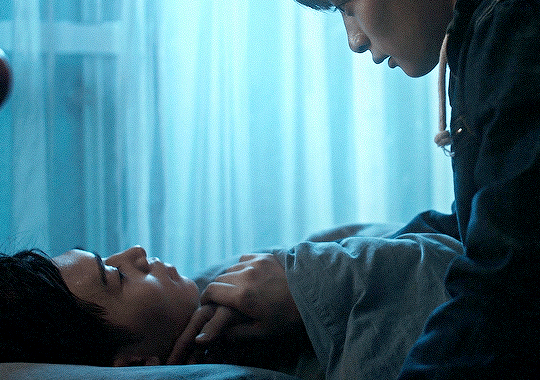
This was the week for boys losing their nerve at the crucial moment, but at least in this show we ended on a more hopeful note and we know this will be cleared up in short order (it helps that this is the penultimate episode for this one). We are definitely back in it with the main narrative arc after a couple weeks of the story treading water, with Natsukawa struggling to confess and Kazuhito attempting to reject himself out of consideration for Natsukawa. These boys are so incredibly kind, but their reticence to put pressure on each other is getting in the way. Kazuhito’s mom certainly didn’t help, but it was satisfying as always to see a Japanese boy run after his sweetheart, even if he didn’t catch him. Side note: I absolutely love Natsukawa’s sisters and would watch a whole show about their adventures.
Over to @bengiyo to add a manga update.
#japanese ql corner#25 ji akasaka de#at 25:00 in akasaka#living with him#kare no iru seikatsu#japanese bl#shan shouts into the void
47 notes
·
View notes
Text
i think subaru is interesting as a protagonist because of the way he gets fleshed out over the story. i mean, its fairly common to reveal character backstories to have their actions leading up to this point make more sense, but for an isekai protagonist in particular i just think the way its done is so interesting.
you start the story with pretty much 0 context about who this kid is. and this is typical genre convention, you assume that you dont need context because its an isekai. the story doesnt really have to establish anything beyond that hes just some nerdy kid. thats how it usually goes right? hes not MEANT to have a backstory, hes meant for the viewer to project upon. and that works for a while but
by arc 2 his very specific character quirks start to pop up, and you also start to see that hes trying VERY HARD to play a role in his head. a very specific role that hes chosen out. and this eventually comes to a head in arc 3, especially after the julius fight and falling-out with emilia. and thats when you see him at his lowest with actual deeply rooted FLAWS. ones he was desperately trying to run from to play the isekai hero role. and then you get the "from zero" speech which is such a turning point for his entire character.
but you still haven't even begun to scratch the surface of what makes him tick. the story doesn't give you his actual backstory until arc 4, with the trial's glimpse into his family and school life. and everything about him makes sense. not that it didnt make sense before but holy crap... hes a character. hes not a just self insert. hes got a lot of really specific fucked up shit going on in his head. he has a family, he had friends, he went to school, he was a teenager... he was a guy! a person! and now you really get who that person is and why hes Like This
and it seems like thats it. from here on out its just about development, arc 5 doesnt really dive deep into any more of his backstory, and arc 6 is all about REGRESSION for him. his memories literally go back to the exact point they were when the story started. though this time we have a lot more context.
that's all you need to know right? i mean by this point the story is seven arcs in, what other possible revelations could there be about the protagonist that would put his entire story arc until this point into a whole new context-
NATSUMI SCHWARTZ
#re:zero#granted if youve read side content natsumi schwartz has been a thing for a while BUT if you havent#by god its natsumi schwartz with a steal chair
63 notes
·
View notes
Text
Hunter's Character Arc: A Hopeful Narrative

Wrote this for the 2-year anniversary of Separate Tides, especially since we now have the boi's full story arc too. This meta could come to life after I re-read the one I wrote about enmeshment (link).
You also get my geeking out about cinematography and visuals this round, instead of the mental health angle that I usually come in from. What I found is this: while some fans feel that the writing put him through too much, the frame composition of every Hunter scene - no matter how dark and horrifying the scene is - wants to paint him as an empowered survivor, and root for him, getting us viewers to be on his side in a way that is never really overt.
The way he is framed within the 'camera', evolves as his story arc evolves throughout the show: from being so high-ranking that only Belos appeared to be superior to him, to actively participating in society as an equal, to not only learn from others and be loved by others but also impart knowledge and love to the world.
Bringing his scenes to life wasn't just about Zeno Robinson's voice acting, along with how animators draw his expressions and poses; the camera also has to be placed in certain ways to add to the emotional weight of his scenes (even if in a subtle manner). These all add up in less obvious ways, to get specific emotional responses from us in the audience.
What I remember from the cinematography classes when I studied animation (honestly the only areas I didn't suck in were the preproduction and film analysis modules, everything else was bleh) are some general rules:
1. Shots with characters that are further away with a wider angle, are often to establish the setting (location and mood). Shots that are closer to the characters are more personal, of course.
2. Both low angle shots and high angle shots provide us with info about power/hierarchy, control and vulnerability in characters. Low angle shots may empower a hero, making them look more heroic if they're roughly facing the camera, but could make them appear vulnerable if their back is to the camera. High angle shots usually depower a character, making them feel small and feeble.
3. Shots with a height that is at eye level with the character(s), allow us to connect more directly with a character.
4. These rules can be creatively bent at times, in shows and movies. And you'd also have to factor in where and which characters are placed within the shots, e.g. their back is facing the camera, vs. us seeing them in full front-view.
- An extra, not-so-important note: There's the rule of thirds, a rough guide for the screen's composition during important moments, to be more aesthetically pleasing to the human eye (which isn't an area of focus in this particular analysis).
There are so many screenshots I could've fit into this post! But there's the 30 pics limit and I've chosen the best ones I could think of.
Diving in...
It's stating the obvious, but the camera gets closer to Hunter as we get to know him more. When we start out, his presence feels distant, ominous and impersonal, like he's a smaller cog in a massive machine, just someone that Belos has sent out to do his bidding:
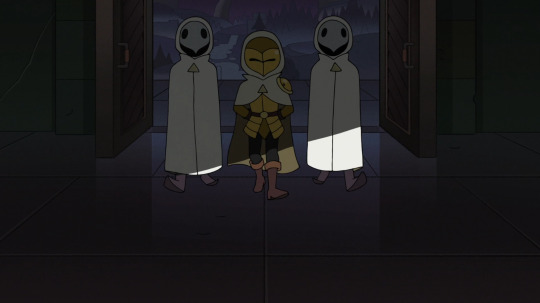

But the sense of his personhood, its importance, and his desire to fight for it, is felt more and more by us as time passes.
A really strong contrast would be this comparison:
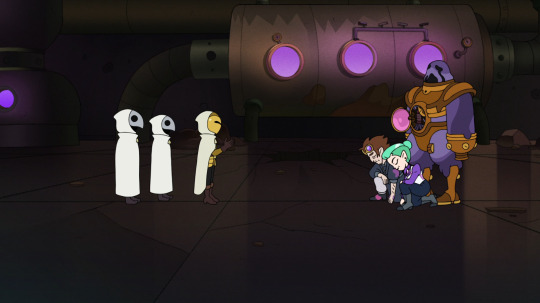
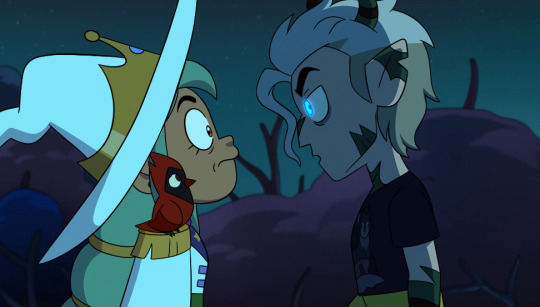
Not quite knowing who this kid is (camera is far away and impersonal), vs. being terrified out of our wits as he appears helpless while possessed, because we're personally so invested in his wellbeing by that point. He has become a literal puppet, 100% physically coerced to do what Belos wants, in a more violent way than Belos previously coercing him to perform his Golden Guard duties using emotional manipulation.



After he was unmasked in Hunting Palismen, we connect with him and his vulnerabilities, since we can see through the armor (both literally and metaphorically) that he has to put up to survive as long as he did in the Emperor's Coven, prior to his decision to run away. We journey alongside him through the good and the bad.
Things become a bit less obvious when we get to low angles vs. high angle shots, plus the eye level shots.
Low Angle Shots:
Before being unmasked, he appears to be an intimidating antagonist who is not to be trifled with (though Luz manages to hold her own against him) and we feel that Luz is vulnerable to being possibly hurt by him:

but once he has met Luz and his mask comes off...

He is framed less and less as an antagonist, and lives out what he truly wants to live out, heroically braving many challenges and triggers to genuinely help others.
This even happens when things are really going south for him, when it appears that he has no way out:

To me, it feels like we are with him, at his level, as the storytelling aims to respect everything that he goes through. All thanks to the camera height, that can go as far as lowering itself all the way to the floor with him.
High Angle Shots:
An incredible difference would be between him watching Luz from the shadows below, even having power over Salty, telling the audience that he has control:

and fast forwarding to Luz offering him her hand during one of the pivotal moments in Hollow Mind:
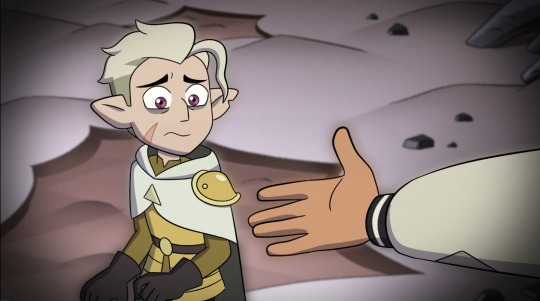
I suppose this one shot is the one of very few that depower Hunter, and here, his old faith in Belos's reign is being dismantled. But whenever this is the case, it's from the vantage point of a kind-hearted character who will offer him help and never hurt him.
What stands out is, any high angle shots of Hunter do not ever show him being all alone with Belos. The closest to that would perhaps be these:


But I'd point out that in the Hollow Mind screenshot, Hunter and Luz in the present are watching from a distance: this moment is a step towards his empowerment because he reaches that awareness and clarity that Belos has been lying to him.
In the For the Future shot, it's the impact of Belos's abuse - the trauma sustained - staring Hunter in the face, not Belos himself. And while Hunter is all alone in the shot, he isn't completely consumed by anguish, having a support network that's obviously offscreen but nonetheless there with him.
The only shots where he is dangerously alone with Belos would be from moments like this:

But he hadn't been unmasked yet, and we weren't even so sure back then about details such as his age, true motives and true intentions. And...any high angle that involves Belos never seems to be used to depower him.
The crew took consideration to respect the portrayal of this kid's experiences of trauma, and his development.
When Luz and Willow look down at him, he may be temporarily rendered powerless, but we can already trust that they won't treat him poorly:
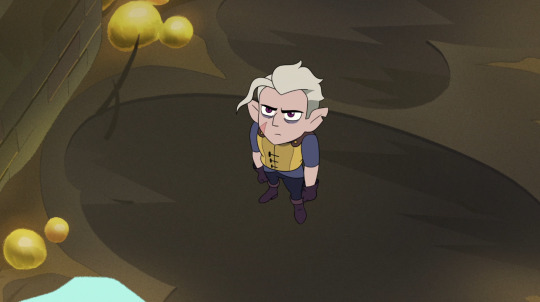
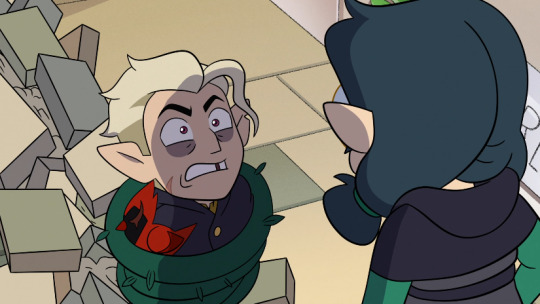
Eye Level Shots:
These seem to be used for moments of uncertainty, keeping us on edge. We may wonder for a moment, where Hunter's loyalties lie, or wonder if he will survive a horrible situation:

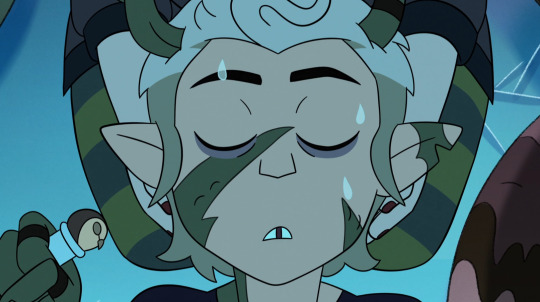
But the eye level shot is also for us to connect as directly as we can with him.
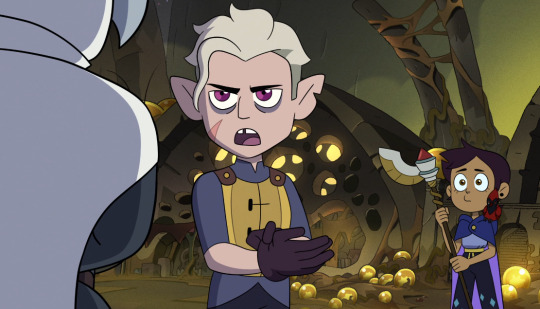
This important frame from Hunting Palismen seems like a pretty unique Hunter shot in his entire arc. I haven't come across any other shot composition like this which involves him, though I could be wrong. He's standing between a taller scout (and the scout is actually lower in rank than him, yet Hunter can't produce the proof that he's their high-up superior) and Luz who is shorter than him.
We may start to sense that he may be less powerful than we initially thought, and there are further confirmations of this in the subsequent scenes. This shot is not quite eye level, yet not a stark low angle shot.
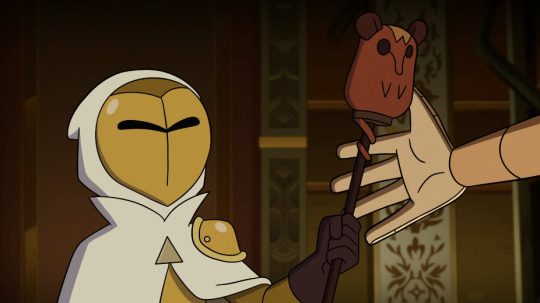

With regards to the unhealthy vs. healthy mentorship he receives in the show, somehow we're told through the frame composition that wanting to be guided towards the right cause is very important for him, something he is emotionally invested in.
My ultimate takeaway from this is: the writers never want to convey that he is beyond hope and saving.
There seem to be far more low angle and eye level shots of him when he is both masked and unmasked, yet different meanings are communicated: control while masked (furthering Belos's cause to wield power in the Isles) vs. empowerment when unmasked (Hunter's own personal agency).
There are a few lovely subversions of what we normally expect from low angle and high angle shots:
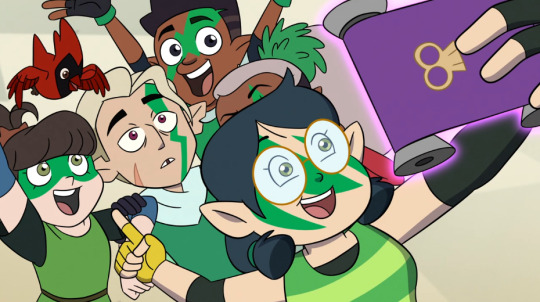
An empowering moment where Hunter is part of something that is healthy for him, instead of high angle shots that are normally depowering for whichever character is in focus.
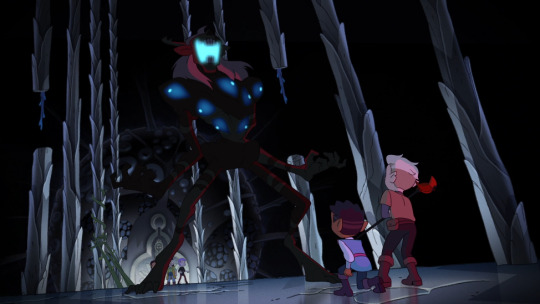
This low angle shot achieves two things, I think: not only to highlight how terrifying Belos is, but also that Hunter isn't alone and has Flapjack and Gus to help him (especially since Gus could disarm him with powerful Illusion magic just before Belos charged at Hunter). No matter how you slice it, Hunter isn't dangerously isolated and isn't rendered helpless here, despite being very terrified. This nicely presents an equal chance on both sides of winning this fight (before The Collector is freed from their prison), and keeps us on edge.
And only today did I notice a pattern from significant frames in all the S3 specials:
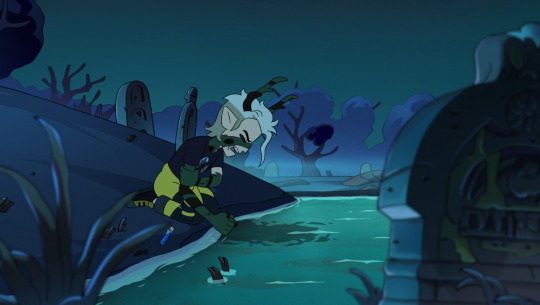


Being on his knees. Look at dat body language!! But the camera never stares him down in a condescending, insensitive and detached fashion: it's once again a low-ish angle that meets him at eye level. Which goes to show how much connection matters to this kid, even in the form of us viewers connecting with him.
To wrap this up...
When it comes to him feeling like he's part of something larger, we feel so different looking at these last two shots:

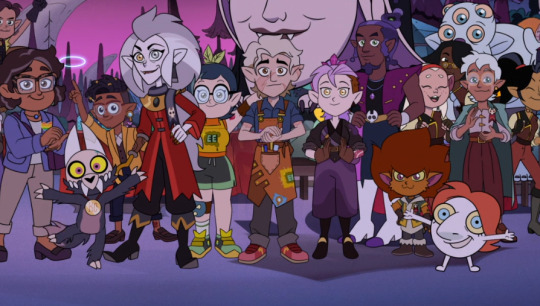
Belonging only to Belos, being owned, dangerously isolated but not completely silenced, reduced to someone whom Belos refers to as "this one", being a breakable "thing"...but later on: finding personal autonomy, his own voice, the things and people that he as an individual loves and wants to nurture and protect, not being above or below anyone in society.
To think that this gentle, empathetic kid's story started and ended at drastically different points.
#yet another spontaneous meta!! that's what this kid does to me#toh hunter#the owl house#toh analysis#golden guard#owl house cinematography#loz writes a meta
232 notes
·
View notes
Text
To celebrate my Lion au post, here are some notes / hcs:
Lionblaze, Jayfeather, and Hollyleaf all have arcs that tackle different themes throughout the arc.
Jayfeathers arc tackles the prophecy-oriented side of things. His character changes the least. I do plan to tweak the way time travel works though (it will be more directly connected to their present - day tribe). Will keep up to date in that regard....
Hollyleafs character is, obviously, altered to an extent. She tackles the code-oriented side of things. She does not murder Ashfur, however..:
Hollyleaf is still driven mad by the truth of her heritage. She is angry at Leafpool first and foremost, viewing her as the root of their problem, as Leafpool was the one to break the code by having kits in the first place. She still confesses the truth at the gathering. She does not run into the tunnels, instead, somewhere more far off.....
After Ashfur is murdered, Lionblaze, wracked with guilt, confesses the crime to his siblings. Hollyleaf, blinded by her code-obsessed rage, later exposes the truth of what happened. Brambleclaw covers for him, similar to how Bramble covered Holly in the books.
Lionblazes character is altered the most (no surprise there). Lionblaze tackles the family-oriented side of things. He is very close to his parents, and you can see most of their drama / conflict through his perspective.
Lionblaze is a character who is simultaneously well-meaning, impulsive, and a bit self-focused. Similar to his grandfather he cares greatly for doing the right thing, even if it means breaking the code (much to Holly's disdain). However, what differs the two is Lionblazes hyper-awareness over his own reputation. Firestar is a cat who will do the right thing, no matter the slack he gets for it, no matter the enemies he makes. But Lionblaze is a cat who needs to be liked.
Due to the nature of his power, Lionblaze becomes increasingly insecure and hyper-aware of the cats around him (he views it as an inherent flaw ; a reason for cats NOT to like him). After his run-in with the Dark forest, he grows paranoid of accidentally harming / killing innocent cats. Frequent nightmares. Battle training sometimes induces panic. Bad habit of bringing home half-shredded prey. He wants to be a good cat, he wants to protect his clan and his family -- but his power only leaves him feeling like a monster. A ticking time bomb. All he's good for is doing the most damage possible, and that's scary to him.
Lions dynamic with Ashfur is expanded upon A LOT MORE. Now, in my au their dynamic is a bit of a mixed bag. They have their bad moments, days where Ashfurs resentment seeps through, but its not all bad. If you know the kind, you know -- The type of adult who will yell at you for a simple mistake, beat you down, but then 10 minutes later praise you and take you out for dinner as a treat. Its complex, it's hard to accept it for the toxicity it truly is, because "They're good sometimes, too". Lionblaze acknowledges that Ashfur was mean, but the attachment is still there. They had their good, genuine moments -- so it's hard to accept the fact that his mentor is a horrible person. Could it be? Could the mentor who told him funny stories about his parents, truly hate them that much? He can remember a time Ashfur peered down at him, smiled and said, "You know, Lionpaw, you're kind of like a son to me." In the moment he felt warm, it felt good. Did Ashfur really care for him that much? Now that same memory sends chills rippling through his fur.
Speaking of, Lionblaze is definitely the most attached of the three. He's incredibly close with Squirrelflight and Brambleclaw. When the truth is revealed, he is easily left the most (emotionally) devastated -- but he is also the first to forgive. He feels hurt, angry, betrayed, but he cannot deny the love he feels for his family, and he cannot deny the love they gave to him. It breaks his heart keeping his distance, seeing the hurt in his mothers eyes while he avoids their presence. He can't keep it up for long. Jayfeather, on the other hand, cant bring himself to forgive as quickly. He is a cat who has difficulty accepting vulnerability - he trusted his family, and that trust was betrayed. (Lion definitely has a bad habit of getting involved in his parents arguments later on lol hes emotionally invested)
The big change: Lionblaze kills Ashfur. You would think he does it out of anger, out of hatred, but no... He does it to keep his family safe. He can't let the secret get out. He can't allow Ashfur the opportunity to harm his littermates, his mother, again. Killing him was the only way, and yet, it leaves him with too much grief and guilt to bare. His entire life he shuddered at the idea of another cat dying at his claws. He was a monster, too strong for his own good, and killing would be nothing more than proof of that. It isn't long before it becomes too much to bare, and he confesses to his littermates. The grief, most of all, is what catches him by surprise. Ashfur was awful, he tried to kill Lionblaze and his littermates! It was wrong to feel this grief, wasn't it? But it isnt long before Lion realizes he wasnt grieving over Ashfur - he was grieving over who he thought Ashfur was; not only his mentor, but a tom who cared for him, despite the short attitude. Not only is his heritage, his upbringing a lie - but so is the very nature of his entire apprenticeship. It is a lot for him to handle.
#wc#warrior cats#warriors#thunderclan#lionblaze#hollyleaf#jayfeather#ashfur#squirrelflight#leafpool#brambleclaw#wc au#warrior cats au#warriors au#wc headcanon#warrior cats headcanons
82 notes
·
View notes
Text
everything now netflix
some spoilers!! and apologies for the long post.
i honestly really enjoyed it! it was almost like a skins/euphoria but imbued with like a heartstopper/sex education vibe in the sense that it dealt with serious teenage issues/mental health but light enough that it doesn't weigh down on you. my character thoughts:
mia was so infuriating almost at all times. obviously under the circumstances, it makes sense but there's this level of likeability that was missing for me. maybe it was the writing or the acting who knows but in my mind it's like this: im making an albeit an unfair comparison to effy from skins or even rue from euphoria, but they were battling their demons and making all the wrong choices but there was still this level of “i want to root for them” that's missing with mia personally.
in a similar vein with alison, she is meant to be this popular rich mean girl archetype who surprises you but obviously in the first half of the season she's supposed to be kind of unlikeable but i found her very endearing. as for the relationship, alison and mia DO NOT belong together. like at all. i am not rooting for them. alison in a way forced a relationship with mia and then also mia was like too scared to say anything about it. its clear that alison liked mia waaaaay more than mia liked alison. like carli says in the last ep as well, “to learn to not be a fantasy to each other”, alison needs to take mia off this pedastal she has for her. i'm very interested to learn more about her character outside of mia though if they hopefully continue the show. i have a feeling that we are supposed to think that she and cameron hooked up at the end or something but i'm rlly hoping its a red herring.
carli is also a character i would love to learn more about. she definitely has more chemistry with mia and i love her for standing her ground against mia, as she needs to help herself before she can be in a healthy relationship. but i will say it was pretty shitty stringing cameron along.
speaking of cameron, i didn't quite expect to like his character as much as i did. in a way his arc in the season is battling toxic masculinity as he kinda seems to come off as this laid back, bro kinda guy but he cares and loves so deeply. it wasn't right calling bec a "sket". i'm not british but obviously its like equivalent to slut, and im very glad he owned up to it. i'm also really interested to know more about his family and stuff.
i love bec as well. she deserves all the happiness in the world. im glad she was able to air out her things with mia, albeit in a very treacherous way and i also love how her mom was supportive of the abortion. i'm honestly kinda tired seeing the mom kicking out the daughter for getting pregnant trope so it was nice to see a mom just being supportive. bec is just such a wonderful friend and mia honestly has a lot to make up for. re not telling mia about her and cam, it was honestly frustrating seeing mia be so petty. i understand that its a big secret and she felt like everyone was hiding things from her but its also right to have secrets amongst friends, idk that really stuck out to me.
will for me had the weakest arc as in it wasn't the most interesting to me. don't get me wrong, i love the character but it just wasnt giving a whole lot to me. i recognize him as more than the comic relief but also at the same time he was stirring the pot in a lot of the arguments / blowups the group had, consciously and unconsciously. though i will say will x theo <3 but comedic duo of the century is will x alison. the little song they did for mia's birthday is stuck in my head.
tldr; great characters and great show. it's really hard to find a show about teens as a 25yo living in a 16yo body that i enjoy and don't find annoying. i just love how each character was able to be so nuanced despite being an ensemble cast.
but knowing netflix's track record it's gonna get cancelled because a) it's good b) has wlw content... but i really hope not.
#everything now#everything now netflix#mia polanco#becca#cameron#will#alison#carli#sophie wilde#niamh mccormack#jessie mae alonzo#harry cadby#lauryn ajufo#noah thomas
86 notes
·
View notes
Text
Adventure Time has the best redemption arcs
I love deep-diving into my favourite shows, which makes me lucky that Adventure Time has been analyzed to death.
It's awesome because it feels like the show itself is growing up along with Finn. The older seasons are a lot more episodic and focused on the surreality of Ooo. Meanwhile, the later seasons really embrace the show's complicated lore and the idea that morality isn't black and white. The progression of maturity in this one show is INSANE. As the show becomes more mature, so does main character Finn, physically and emotionally.
Nowhere are the show's themes and Finn's personal growth better demonstrated through the show's use of redemption arcs. As the show progresses, classical villain-hero archetypes are subverted to show that Finn is learning that people aren't exclusively good or bad. As the show and Finna age, being a hero or doing the right thing evolves from the basic idea of "fighting evil" to being empathetic and seeking peace.
Heavy spoilers for the main series after the cut.
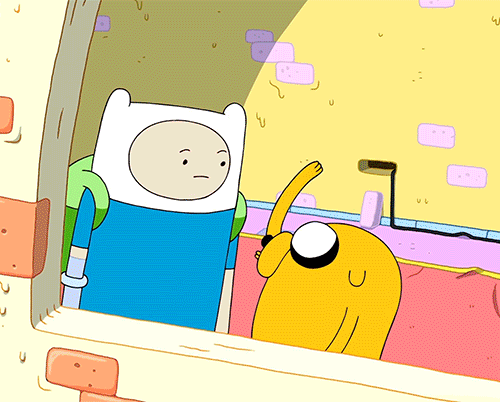
Some context
I just wanna mention some facts about the show's history.
If you watch the first AT episode followed by the last episode, you're gonna feel disoriented. They're clearly the same show, but it feels like they have very different goals. Early AT is more lighthearted and less serious. The episodes have morals, but they're pretty simple. The randomness of Ooo is played more for comedy than for lore purposes.
Around season 5, the show started taking on a different direction. It's still funny and weird, but the characters are more fleshed out and the messages the show is trying to convey require a lot of digestion. For example, Princess Bubblegum is always smart, but the way she's depicted in episodes like"Enchiridion" vs "Burning Low." Although I consider this a massive improvement, it's unclear how much was pre-planned. Was PB always destined to become a control-obsessed, unethical ruler-scientist? Or was her initial characterization just Finn's crush?
Yes.
Episodes as early as season 1 ep 24 ("What have you done?") show PB acting more like a tyrant than a princess and have the Ice King depicted in a less antagonistic matter. The reason for the tonal shift in the later season is that as Finn grows up, his experiences change the way he perceives reality.
Ooo through Finn's eyes
Adventure Time is about Finn the human and Jake the dog, but really it's mostly about Finn.
The other characters get character arcs and have plot-relevant conflicts, but the show's main focus is dedicated to Finn's coming-of-age story. Finn is Ooo's hero: he's social, caring, and brave, and he's motivated by a strong sense of justice and a desire for adventure. All he wants is to try new things and help others at any cost.
However, he's only 12, at least at the beginning. His idea of being a hero is rooted in black/white morality. If you do bad things, then you're bad. Stopping bad people makes you good. And as a 12-year-old, he believes the only way to stop bad people is through violence.
The show is immature in this respect, too. For the first few seasons, there are two main antagonists. There's the recurring Ice King and his plots to force princesses to marry him, playing off the "save the princess" trope (more on him later). And then there's the Lich, who's a genuinely powerful cosmic entity that seeks to destroy life in all its forms. Naturally, Finn fights them both off through righteous punching.
The show presents this basic understanding of evil, that evil is as evil does. In the beginning, there's almost no nuance to these characters. And this is true with good characters, too.
Billy is a huge catalyst for Finn's character development, but you can see the show's limited understanding of heroism in his debut episode. Billy is Finn's predecessor in a way, being the number one fighter against evil. In "His Hero," Billy realized the fighting evil through violence didn't treat the root problem, opting instead for community activism. However, the show makes this look like a bad thing, with the moral of the episode being that violence can solve problems. Ironically, Finn's character development mirrors Billy, as he realizes over time that he fighting evil might mean hurting people he cares about. Case in point: Simon Petrikov, the Ice King.
The power of redemption arcs
Redemption arcs are controversial because they're ideal but they feel forced if they go unearned. In Adventure Time, redemption arcs serve a two-fold purpose: to convey the message that "evil" people can be understood and rehabilitated and to show Finn's developing maturity as he realizes this.
Ice King
The first character to get a real redemption arc is the Ice King. Initially, he's portrayed as Jake and Finn's natural nemesis, especially when he targets Princess Bubblegum. However, as the show goes on, it becomes clear that the Ice King isn't really malicious; he's just lonely and he doesn't know how to socialize in an appropriate way. Over time, he becomes a sympathetic villain. However, this changes with the Christmas specials "Holly Jolly Secrets, parts 1 and 2." In this episode, Finn and Jake discover the Ice King used to be a man named Simon, whose personality and sanity were corrupted by magic. Simon's backstory is further developed in "I Remember You" and "Simon and Marcy." From this point on, Finn starts referring to the Ice King as Simon, acknowledging Simon's true self and stops treating him less harshly. This leads to a really heartwarming moment in "Don't Look," where Finn's perception literally warps reality, causing the IK to revert to Simon (in appearance but not in personality).
Consequently, the Ice King becomes less antagonistic in general and we even get IK-centric episodes where he takes on a heroic role. For all intents and purposes, post-season 3 Ice King is Finn's friend. The show went from using a cliché villain-type to dedicating a significant amount of time and plot to Ice King's eventual return as Simon. From this, Finn learns that treating people with kindness is imperative to stopping evil. Not only did finding out that IK's personal life was tragic but by treating him as a friend he diminished IK's evil inclinations.
Magic Man
Magic Man is one of the more disturbing characters on the show. He always shows up to do something gross or psychologically messed up. Unlike the Ice King, who was shown to be evil because he wanted companionship, Magic Man wants people to suffer out of pure contempt for the world. His "pranks" include simple stuff like turning Finn into a foot, to more deranged acts like forcing Jake to escape a dream world where doing so would mean destroying all his new friends.
What's interesting about Magic Man's redemption arc is that Finn and Jake have little to do with it. Magic Man redeems himself practically by accident.
We gradually learn that Magic Man's wife was destroyed by GOLB, a powerful entity that can erase things from all realities. So Magic Man's cruelty is best described as frustration or vengeance to an extent. He is constantly suffering, which he tries to mitigate by deriving pleasure from others' suffering.
However, he eventually loses his magic powers (and with it, his anger and sadness) in"You Forgot Your Floaties", grounding him back in reality. From then on, his journey is one of atonement. He tries to reconcile with his family and seeks forgiveness from the people he has tortured.
This arc says more about the show's maturity than it does about Finn's. Although Finn shows no hatred towards a magic-less Normal Man, he seems pretty indifferent. The show, on the other hand, takes the time to make him a tragic figure and offers him a chance at redemption. It wants the audience to know that experiencing loss is not an excuse for being a jerk, but it can explain someone's actions.
King Man's (his title after rejoining the Martian community) redemption arc also demonstrates AT's advancing writing skills. Instead of giving King Man a clear-cut redemption arc, the show depicts him as genuinely sorry without changing his personality. King Man is still obsessed with Margles and is harsh with Martian prisoners, but he's no longer angry with the world. He hasn't moved, as is difficult to do with grief, but he wants to contribute to society instead of rage against it.
Betty Grof
Betty marks a milestone in the show and Finn's personal growth. She is the first antagonist who is shown to be sympathetic from the start. It helps that we know Betty before she goes crazy with magic, but despite that, Finn nor the show ever thinks of Betty as an "evil" character. She's misguided and unethical but well-intentioned.
Betty's whole deal is that she wants to be with Simon, which requires curing him of the Ice King Crown's effects. However, after she absorbs Magic Man's madness and sadness, she starts undertaking strategies that cause Ice King more stress than good.
She becomes a true antagonist in the Elemental mini-series when she prioritizes Simon's recovery over the lives of Ooo's inhabitants, despite the Ice King begging her to save his friends. Even after she betrays Finn, he doesn't seem to see her as a villain specifically. The real source of conflict in the Elemental series was more so the unchecked emotions of Finn's friends; Betty was just an obstacle.
Betty's redemption arc is completed in the show's finale. Betty summons GOLB, risking the entire universe's destruction to save Simon. Except her goal is not only to save Simon but to save their relationship. In an act of self-sacrifice, Betty manages to banish/merge with GOLB to save Ooo, despite knowing she could never be with Simon.
However, it's not as clear as I make it out to seem. While Betty does sacrifice her relationship with Simon, she still manages to save him, begging the question: if Betty couldn't save Simon, would she have made that decision? (I'm inclined to think no, but let me know what you think!)
Even if the "redemption" part of her arc feels rushed, it's Betty's journey that highlights the show's maturity. Just because she does bad things doesn't mean she's a bad person. Finn gets this; he doesn't blame Betty for almost destroying the world. He's more focused on aligning with her desire to save Simon and the rest of Ooo.
Through Betty, Adventure Time explains that it's impossible to judge people as good or evil. To do the right thing doesn't mean to help people who you think are "good" or oppose people you think are "evil" but to find common ground and a common goal.
Uncle Gumbald
He's basically the last antagonist of the show. I don't think there's a lot to say about him that hasn't already been said, so this section will be short.
He's a lot like PB in that he's a visionary. Their conflict stems from their competing ideas and the fact that they both want to subjugate each other.
They almost reach an understanding in the finale when they experience each other's lives, with PB realizing that Gumbald deserved to be treated as an equal. However, he isn't redeemed because he attempts to subjugate PB anyways by faking a truce. I feel like this was supposed to highlight PB's character growth as early PB definitely wouldn't have been willing to share authority.
Fern
I would say this is probably the most important redemption arc for Finn's character. It's weird to say that because Fern is introduced so late into the show and his arc is completed when he dies in the last minutes of the finale. Furthermore, he's a strange character to begin with. He's a grass clone of Finn made from two magic swords, and he's hardly antagonistic toward Finn except in the last two seasons.
But let's look at what we're dealing with here.
Fern's internal conflict is an identity crisis. At one point in the series, Finn comes into contact with a past self (merging timelines situation, dw about it), turning one of his selves into a sword. It's intentionally ambiguous at first, but it's eventually revealed that there is a miniature Finn inside the sword who is cognisant of the world around him. Because of Real Finn's carelessness, Sword Finn ends up getting busted, and eventually infected with a grass parasite, creating Fern.
Up until now, Finn has been acing his new pacifist approach to conflict resolution. He now prioritizes understanding someone's actions and reasoning with them, saving fighting as a last resort.
Fern represents Finn's greatest empathy challenge: trying to understand someone he thinks he already understands. To do this, Finn has to accept that his preconceived notions of Fern are wrong and take the time to get to know the real Fern. He thinks that because they share some sort of biology and memories, they are the same people. He fails to acknowledge the different life experiences that have forged him and Fern into distinct people.
When Fern heel-turns into an antagonist, it's not a surprise. We have seen repeatedly the jealousy that he feels outcasted by the real Finn. We also know he's frustrated with the dissonance between his past "life" and his current circumstances. Like Betty, Finn doesn't see Fern as a villain. However, he doesn't try to understand where Fern is coming from. He assumes that because they are similar, Fern will be willing to talk things out. In other words, Finn wants to reconcile with Fern but doesn't get how devastating Fern's identity crisis is.
In the finale's dream-dimension fight sequence, we see Finn finally hear out Fern's concerns and the two explore Fern's past together.
Fern does die because of plot reasons, but not before re-establishing his and Finn's friendship. I don't really like it when stories sacrifice one character for another's development, but it makes sense given Finn's narrative is about realizing that doing the right thing isn't always a feel-good experience. Finn wants the people he cares about to be safe, and he knows that Fern is in danger by siding with malicious characters like Gumbald. Fern also decides to align with people who care about him rather than someone who wants to use him. If Fern's villain arc is caused by feelings of inadequacies, then it's resolved through self-acceptance. Redeeming Fern requires Finn to truly understand Fern, but this means Finn loses someone who gets him.
I think it's implied Fern could never be at peace alive, since the grass demon was keeping him alive while corrupting his heart. It's a unique take on a heroic sacrifice: setting Fern free means letting Fern go.
Misc. thoughts
Not all redemption arcs are equal. I wanted to touch on a few mini-redemption arcs that either didn't fit the post or had a lesser impact on the story. These aren't relevant to the text, so feel free to skip to the conclusion.
Irredeemable villains
Some AT antagonists never get redemption arcs. These are usually one-off villains who don't get much characterization apart from just being evil. I don't think that AT wants to imply these people are beyond help (see Magic Man for proof), but maybe becoming a good person means that someone has to understand you first, which is harder to do in some cases. Examples include:
Ricardio the heart man
Thief Princess
Wyatt
Redemption arcs?
Originally, I wanted to write a section on Princess Bubblegum and how she gradually releases her iron grip on her kingdom. However, I decided against it because Finn never really sees her as a bad person. However, understanding that she's not perfect is definitely part of her arc. If I were to write about PB, it'd have to be a separate article, probably incorporating how Marceline plays into her character development and how her relationship with evolves over time.
Another character I omitted from this analysis was Lemongrab. I wouldn't describe his arc as a redemption arc because I feel it was more focused on self-discovery than making up for his past actions.
Finally, I thought about writing about the Lich's transformation into Sweet Pea, but I almost don't count it since they are essentially two different characters. A redemption arc to me means that a character undergoes a change of heart. I feel like Sweet Pea is more like the Lich reborn, and while you can argue that the events in "Whispers" are the good Lich fighting against his dormant persona, I feel like it's clear that Sweet Pea and the Lich are not one and the same. Either way, Sweet Pea being the Lich's redemption is to muddy to discuss in this context.
Becoming good
One thing I like about Adventure Time is that no one tries to make the bad guys turn good. Redemption arcs are mostly self-initiated. With characters like Ice King, Finn doesn't try to turn him into a hero, he just stops treating Simon like a villain. Unlike in other media, heroes and villains are not real roles in AT. They are more like social constructs that are easily altered once you start to empathize with supposed villains.
But while "villains" is a flexible term in AT, evil-doing is not. AT puts forward the standard that people should seek forgiveness and atone for the ways they've caused harm. It's a pretty grown-up idea that we should own up to our actions but also forgive people who want to be forgiven.
Conclusion
In Adventure Time, Finn wants to be a hero, but in trying to do so, he needs to answer this question: "What makes a hero?" Originally, the show asserts that a hero is someone who beats up bad guys and obeys people in authority. But as Finn and the audience get older, the show's ideas evolve, too. Through the use of its extensive rogue gallery, Adventure Time affirms that "bad people" are usually just normal people with personal issues. Heroism becomes less associated with righteous violence and more geared towards empathy and reconciliation. Eventually, Finn and the show give up on the hero-villain dichotomy, acknowledging that these categorizations prevent people from helping those who need it most.
Note: this is the first analysis I've posted on Tumblr and I'm planning on writing more with the goal of getting better at writing and media literacy. Additionally, I really love this franchise and I'm always down to discuss it further. Please let me know what you all think?

#adventure time#adventure time analysis#tv analysis#cartoon network#finn mertens#finn and jake#princess bubblegum#ice king#magic man#betty grof#fern#uncle gumbald#golb#the lich
272 notes
·
View notes
Text
Twig Liveblog for Arc 14
lots of crazy shit happened in this arc it was so good!! first of all it's so psychedelic. the lambs talking about sylvester in the third person while he just sort of mopes around, barely alive--really a terrifying section. the city of new amsterdam provides quite the psychedelic backdrop too, with pulsing walls and living buildings.
and it's got so many cool nobles!!! i love the infante so much, you all have no idea. greatest wildbow character of all time. and then my second favorite wildbow character of all time (the god mauer) shows up too... and then the two queens face off... we're truly spoiled. this arc has probably some of the best Mauer Moments™ so far. he fucking slits syvette's throat what a badass. his encounter with augustus the noble was kind of beautiful--we see mauer's drive and doubt and determination in one fatal moment. even if mauer commits the most evil acts of all time i'm still ride or die for him.
the time spent as evette was insane--sy's psyche, which has been splitting since the death of jamie, has its most dramatic fracture yet. i find it fascinating the way sy's identity exists only in relation to the other lambs. sy is sy only insofar as he is not helen, gordon, lillian, etc. and when the equilibrium is disrupted, sy cannot really be himself. the lambs are like one organism it's so evil to split them up!!! i think the sequence where evette has her heart outside her body is a metaphor for this idea. i mean they did it to themselves here lol but i guess it's just part of sy's Journey. twig is so existentialist. sy must create himself.
my favorite part of the arc was mauer taking evette to The Block. it felt like something out of true detective. we get a kind of answer at the end of the arc, but there is still so much mystery. i'm such a sucker for conspiracy thrillers involving the abuse of children. such haunting context, too.
and then right after they talk about the child trafficking jessie comes out lmao. so sweet!!!!!!!! the love between jessie and sy is so pure and beautiful it makes my heart race. they understand each other so deeply and fundamentally and intimately. they must kiss imminently!!!!!!!!!!
the interlude with lillian made me want to be an academy student so bad even though it seems so awful lol. it's like "the magicians" i just want to escape into the evil fantasy school. then the infante shows up again let's fucking goooooo. he's very mean to lillian and the lambs but that is his right. i'm also very intrigued about the idea of giving wyvern to the duke, but i would root heavily against him in his quest to harm the infante. i only liked the duke before i knew about the infante, and now that i know there is a larger, more powerful noble, the duke is basically a stupid maggot to me who must be squished more.
#twigblr#henghost's twig arc#twig liveblog#sylvester lambsbridge#the infante is my noblekin#i would die for him
34 notes
·
View notes
Text
Review: Wish (2023) [SPOILERS]
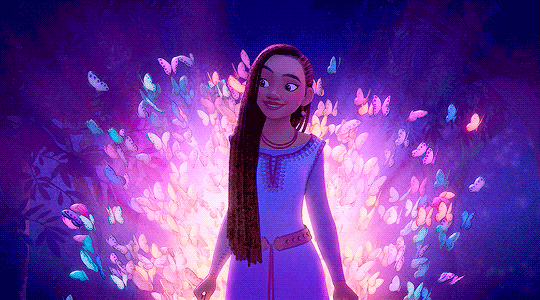
Evening, everyone! Tonight my mother and I went to go see Disney's most recent film, Wish, which fortunately came to theaters in my area right before its formal American release date. I'd been very curious to see how this tribute to Disney's last 100 years of filmmaking would turn out, and now that I've seen it...well, I have to be honest, I was a little disappointed. I want to be very clear both that I was going into this with a rather sunny outlook and that there are things I really liked in this film...but overall, it felt like a lot of the good ideas it had were only half-baked, and I found myself -- forgive me -- "wishing for something more" than what we got.
For a more comprehensive deep-dive...a cut!
The Good!
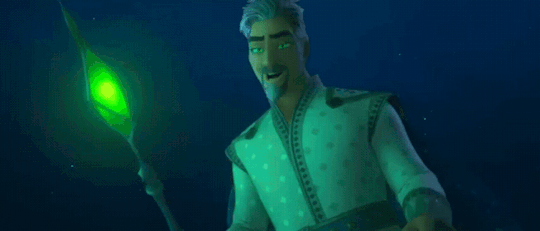
+The single best element in this film for me was Chris Pine's performance as our villain, Magnifico. There are definitely some things I can critique about Magnifico's overall storyline and "character arc" further down, but Chris was clearly having a grand old time being an egotistical, sassy jerkwad, and it totally showed. Even in his villain song This is The Thanks I Get?, which just screamed "passive-aggressive abusive parent," you can hear how much fun Chris was having in the studio, recording it. I just about always enjoyed when Magnifico was on screen, and I actually did really like the idea that a lot of his villainy is rooted in him being obsessed with control over everyone and everything. In a weird way, Magnifico's turn to the Dark Side parallels Anakin Skywalker's in the sense that he lost so much in the past that he's determined to never lose anything important to him again -- especially the power he's accrued to make himself feel strong, after having felt so powerless. I find that very interesting, and I kind of wish that aspect was really highlighted more in the story, but we'll talk about that later.
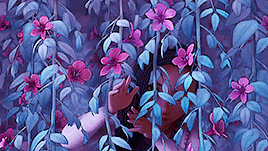
+Asha was a likable enough heroine, even if I found her to be a lot like a two-way fusion of Mulan and Anna placed in a vaguely Snow-White-ish role in her clearly Seven-Dwarf-inspired friend group. Ariana DeBose portrayed her rather well, both acting and singing-wise. I also liked the "social justice" bent to Asha's character where she wants better things not just for herself and her family, but also Rosas overall -- in the French translation of her main song "This Wish," they even push this further by having Asha wish "to see the world happy again someday." We haven't seen a heroine really express this kind of desire for a positive change in the world since Esmeralda in The Hunchback of Notre Dame, and that's cool! Plus representation in mainstream media for previously underrepresented groups is always nice. ^.^
+As much as I don't think they all got enough focus as individuals, I liked Asha's friend group! Especially the fact that it is a friend group made up of people that are around the same age as our protagonist, which -- let's be honest -- isn't that common for Disney heroines. Often with "sidekick groups," you're more likely to have situations like Cinderella with the mice (who are more like cutesy sidekicks than equals) or Snow White with the Dwarfs (who are all quite a bit older than our heroine)...so a friend group made up of peers with their own personalities and motivations was kind of fun.
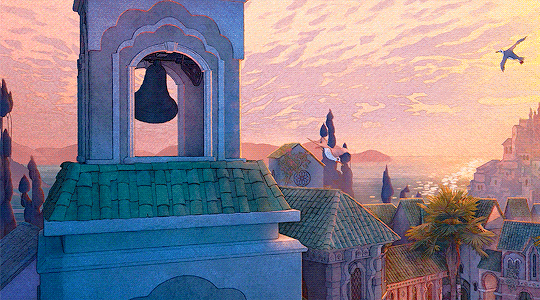
+The setting of Rosas itself could be pretty. I liked a lot of the Mediterranean-inspired architecture, especially inside Magnifico's tower.
+The combination of 3D and 2D-esque animation was also interesting! It really served to give the film its own distinctive visual style that sets it apart from other Disney projects, which I always appreciate.
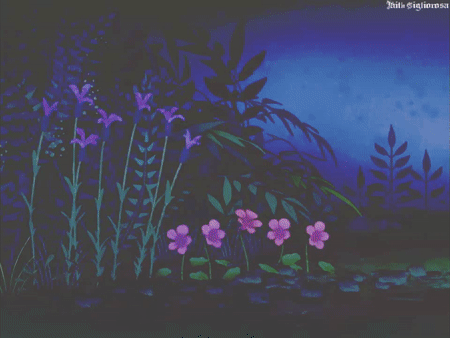
+Star was...cute. Obviously just designed to sell plushies and definitely reminded me way too much of Kirby, but cute enough. I do think it's kind of cool that they're never gendered at all in the entire movie, because it'd be silly to think of a sweet little androgynous ball of stardust as being specifically male or female.
+I liked the idea of Simon "betraying" Asha, only to be turned into a pawn by Magnifico in the process, but not being treated unsympathetically by the story for it. Didn't love the full execution of the idea, but hey, that's what the negative section is for.
+The idea of everyone finding the power inside of themselves to stand up against Magnifico (because they're "all stars," and presumably all have the magic needed to make their wishes come true) was a little predictable, but still sweet. I have problems with how the film wrote it (which we'll get to), but the idea itself was wholesome and fitting.
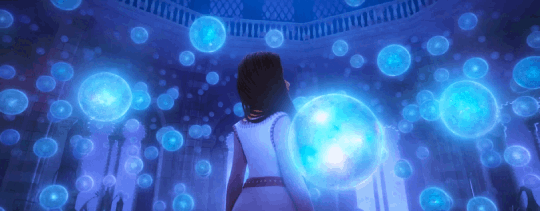
+I like several of the songs, just on their own -- I added This Wish and Knowing What I Know Now on my ITunes as soon as I first heard them prior to the film's release, and now I've added At All Costs too: it's a really pretty duet! (Gorgeous work, Chris and Ariana!) I'll leave my praise here, though, because sadly the soundtrack is going to get a lot of discussion in the less positive section.
The Not-So-Good...
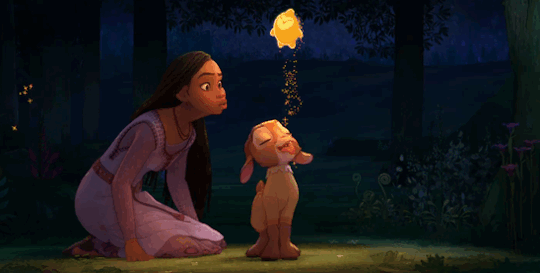
+This film being "Disney's 100th anniversary film" really got in the way of this movie telling a compelling and unique story sometimes. The whole movie really twisted itself into a pretzel trying to check off all the usual Disney tropes, and there were points that certain choices made the story seem incredibly stilted. For instance, one common Disney trope is a dead parent, so of course Asha has lost her father -- but we learn so little about him and he ends up playing such a small role in Asha's arc and story that it seems like an unnecessary detail. Asha's grandfather honestly plays more of a role in Asha's motivation throughout most of the film, so it would've made just as much sense to have Asha's grandfather be the one who believed in stars having power, rather than her father. Another example is the concept of the cute animal sidekick who's just there to make jokes -- as much as Valentino the goat didn't annoy me personally, he added just about nothing of value to the story whatsoever aside from comic relief, in contrast to other funny sidekicks like Sebastian from The Little Mermaid or Olaf from Frozen, who also serve a plot purpose and have a developed relationship with the protagonists. Then there's Asha being cut from the same "naive, awkward, wide-eyed idealist" cloth as many of our Disney Revival heroines like Anna, Rapunzel, and up to a certain point even Mirabel are; Star being in a similar vein to cutesy, innocent sidekicks like Pua, Crikee, and Baymax while Valentino is more akin to sassier, comic ones like Mushu and Sisu; her friends literally being based on the Seven Dwarfs from Snow White; our heroine getting a pretty standard "I Want" song and the villain getting his own solo number that doesn't really take any risks...oh yes, and we mustn't forget the trope of the Storybook opening, which (I'm sorry) I know was supposed to be a reference to Snow White, Cinderella, and Enchanted, but just gave me Shrek vibes the entire time. I was waiting for Shrek to rip out the page and use it for toilet paper any minute. It just felt a lot of the time like the movie was very paint-by-numbers, rather than throwing in much that was surprising or different.
+This isn't even touching all of the pointless meta references to other Disney movies. Asha wearing the Fairy Godmother's cloak and getting a wand like hers at the end -- the mushrooms crowing "we love crazy!" the way Hans did in Love is an Open Door -- Asha riding the reindeer the way Kristoff did in Frozen 2 -- Magnifico using green smoke hands a la Ursula -- the ending with those obvious Wendy and Peter Pan look-alikes, come on, really??? That was just painful.
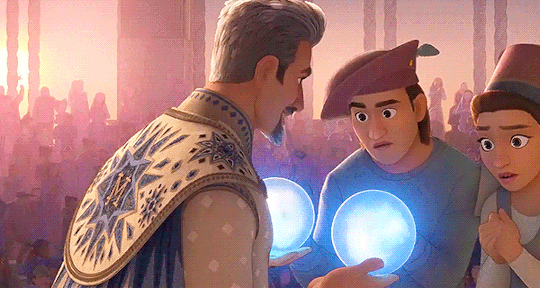
+As much as Magnifico was an awesome idea for a character and Chris Pine's performance was beyond entertaining, the movie did not always write him as well as they could've. From the very start, we see this guy is an egotistical control freak -- obsessed with his own image, incredibly hard-to-please, arrogant, vain, desperate for attention and unwavering praise and adoration from all of his subjects, and determined to keep an iron grip on everyone else's wishes because of the power it gives him. He's ALREADY a terrible person, from the start -- and yet the film tries to introduce this dark magic book that gets no explanation or backstory whatsoever and has no real characterization or presence, so it leaves no real impact on the audience corrupting him and making him a bad person, when it didn't need to! Magnifico was already the villain this film needed! Just let him fall head-first into madness without the book prompting anything! Even if Magnifico "lost everything" in the past, that doesn't make him a good person, if he takes everyone's wishes away from them and hoards them all to himself, only to grant a few now and again when it would make him look good.
+This above point actually leads nicely into one change I really, really wish the film had been ballsy enough to make -- have Asha already be Magnifico's apprentice, not trying to become it at the start of the story. Give our villain and hero a real relationship, with history that started before the events of this film! Asha lost her father at the age of 12...how interesting would it have been -- whether to make Magnifico more of an anti-villain or show how manipulative he really is -- if he'd tried to fill that fatherly role for our main character and twist her to serve his ends? What if At All Costs was rewritten to be about Magnifico not just being determined to hold onto all of the kingdom's wishes, but also this apprentice he sees as an extension of him and his legacy, while Asha is determined to protect this Star she's accidentally summoned and the suppressed wish of hers it represents? This change would've made Asha's break with Magnifico so much more powerful for both of them -- it would've both justified Magnifico's descent into madness and given Asha more reason to feel like it was her responsibility to stop Magnifico. You even could've then played more with Asha's relationship with Queen Amaya too, in this kind of a scenario.
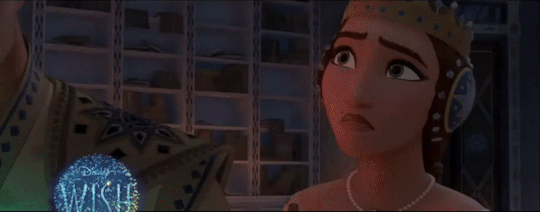
+Oh yeah, and on that note, Queen Amaya. OOH, this really annoyed me -- okay. So this woman is supposed to be a good guy, in this story. But as I touched on earlier, Magnifico was already a pretty awful person, hoarding people's wishes away in order to make himself powerful. Was Amaya truly so blind to that? Did she truly never question anything, ever? But no, really, she only turns on Magnifico after he starts using the dark magic book and actively threatens her. Only that makes her turn from him, and it's pretty damn immediate. Now okay, I hear you saying, it's like Amaya sings in Knowing What I Know Now, right? "The good in him, I've watched it melt // I was blinded by the love I felt"? Excuse me, lady -- but Magnifico wasn't a good person, before. He was just playing a part so as to stay powerful and adored by the masses. And if the story wants to claim otherwise, and act like that dark magic book was responsible for Magnifico going bad, then why would our Queen decide to keep him locked up in his staff's crystal forever? If the book was responsible, then Magnifico would be the Frodo or Golum to the book's One Ring -- he'd be a victim, in such a scenario: one in need of help and pity, not punishment. So either Amaya is a selfish person who only cared about her husband's mistreatment of others when it affected her, or she's a needlessly cruel person who decides to punish her husband for a vice that anyone could fall prey to. Either way, I don't want this woman ruling anyone! Make this woman a straight-up villain, same as her husband, and have the whole monarchy come crashing down after she and Magnifico both go down in flames! VIVE LA RESISTANCE! (Playing into my idea with Asha being Magnifico's apprentice all along, maybe there could even be a twist on the Evil Stepmother trope with Amaya, where she's jealous of how much Magnifico has tried to groom Asha as his apprentice, rather than spending time and/or starting a family with her or something.)
+As I touched on earlier, there wasn't even close to enough time to develop all of these characters properly. Since our heroine and friends are most similar to Snow White and her friends the Seven Dwarfs, let's compare cast size. Snow White is 83 minutes long and has a cast of ten (Snow, the Prince, the Queen, and the Dwarfs) -- Wish is 95 minutes long and has a cast of fourteen (Asha, Magnifico, Star, Valentino, Amaya, Asha's mum and grandpa, and our seven Friends). This results in us getting the vague idea that "Grumpy" role Gabo is sweet on our "Bashful" role Bazeema, but no time to develop their relationship or give it any kind of conclusion; the others saying "Sneezy" role Safi apparently loves the castle chickens with no sympathetic explanation why, to the point that he gets super excited about a chicken growing to a giant size for no real reason; "Doc" role Dahlia having a crush on Magnifico that is then dropped immediately after Asha turns against him; oldest kid and "Sleepy" role Simon feeling incomplete without the dream he gave Magnifico and "betraying" Asha as a result in an attempt to get it back, only to get stabbed in the back by Magnifico, and then have no time for a proper redemption after he's unhypnotized; Asha's grandfather turning on a dime about whether or not he wants to know what his wish was if Magnifico thought it was dangerous; Magnifico getting some justification in his backstory for his bad behavior, but Amaya's backstory being a complete black hole before she married Magnifico when you'd think it'd explain all the more why she stuck with him so long; and Asha's mum having her wish crushed to dust by Magnifico and then given back without us EVER LEARNING WHAT IT EVEN WAS IN THE FIRST PLACE, even after we see just about everyone else's wishes as soon as somebody picks it up and Asha's mum's wish gets picked up multiple times!! Come on, if you're going to set up NOT showing it, you may as well have a pay-off for it!! At least give us some moment where Asha's mum hugs her in relief and acknowledges that her daughter was her wish! That would've been a nice "aww" moment for everyone!
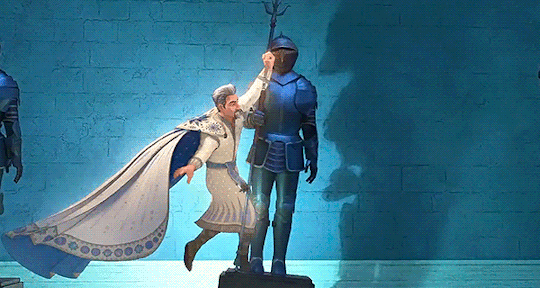
+Okay, I said I was going to talk about my problem with the songs, so here goes. As I said before, I listened to the soundtrack before watching the movie, and even when I did, I could immediately sense a problem: these songs did not tell me much of anything about the movie, just on their own. Welcome to Rosas, which is pretty much just an exposition dump about the kingdom and how Magnifico founded it, didn't really paint a picture of our setting or characters much at all, the way opening songs like Belle or The Family Madrigal do. This Wish, although pretty, was something I could hear just as easily on the radio -- it didn't feel as tied or necessary to understanding our heroine the way something like Part of That World does. I'm a Star, quite frankly, felt like a lot of inspirational word salad, rather than anything particularly memorable or revelatory -- why else wouldn't it even be worthy of a musical salute in the reprise, where Asha remembers that she and everyone else are stars during the climax? Even after reading summaries of the plot and spoilers from the storybook for this film, I could not figure out for the life of me how At All Costs would fit organically into such a story, being sung by our villain and hero. It wasn't until I saw the film that I saw how the filmmakers decided to fit it in and honestly...the song didn't help tell that particular scene at all. It's a really pretty song and I like it a lot -- but it lacked any of the irony or contrast that kind of a scene that introduces the difference in focus between our hero and villain required. If the scene itself is needed to understand what's supposed to be going on while the song is playing, then the song is not effectively telling the story and is therefore unnecessary. There wasn't even a particularly Spanish or Mediterranean flair to the soundtrack to help set the stage, aside from the occasional flourish of castanets -- instead it sounded very contemporary, which I guess is appropriate, since it was largely written by pop composers rather than any musical theater talent.
+There were also points where the songs felt the urge to shove in a bunch of extra words just because, rather than have the words flow well and really mean something. I'm a Star is most guilty of this, of course, but even in This is the Thanks I Get?, we hear Magnifico gripe that "I let you live here for free and I don't even charge you rent" -- mate, THAT MEANS THE SAME THING! If you live somewhere for free, then you are NOT paying rent!
+Knowing What I Know Now is a bop and I like it (aside from Amaya's stupidity), but I'm sorry, all I can think when I hear it is "This is clearly trying to be Ready as I'll Ever Be from Tangled the Animated Series, but that song blows this out of the water." However fun the song can be, it would've been so much stronger if it actually addressed the contrast between the characters and revved us up for a big final battle, instead of it just being our eight underdeveloped characters psyching each other up.
+The idea of everyone being stars was a lovely idea, but the execution of Asha remembering this fact and using it to defeat Magnifico was terribly handled. First off, there was no revelatory phrase or action that prompted Asha to remember this fact, so her suddenly saying that "they're all stars" came out of nowhere. Second, even putting aside that there'd be no way any of her friends could hear Asha from all the way up on the tower if they're stuck in the courtyard below, there's no reason I can see for Asha's friends or family to know what the hell she was even TALKING about. They weren't there when the I'm a Star number happened! And the way that number made it seem, just based on the visuals, it looked like the "star" power came from a person's dream, since it's the same glow that returns to Asha's grandfather when he gets his dream back, but most of the town's dreams have been already yanked out by Magnifico at this point! I think the idea is that since everyone is a star, even with that big piece of them and the power accompanying it taken out, they still have enough stardust inside of them to be powerful enough to chase their heart's desires...but yeah, I'm sorry, for all the word salad I'm a Star threw around, this world-building aspect was really not made clear, and because of that and the lack of a proper callback to this plot turn, the climax didn't hit as strong as it should've.
Overall, this film felt a lot like a batch of unbaked chocolate chip cookies that someone decided to throw a bunch of brightly colored sprinkles on top of, just because they could. A lot of ideas just don't feel like they were fully developed, and there was a lot tossed in that didn't contribute to the overall taste or bring the disparate elements together in a cohesive whole, instead feeling more like a distraction than anything of actual substance. That doesn't mean I couldn't eat it -- I like eating cookie dough as much as the next person -- but that doesn't mean it felt like a complete, finished product worthy of great praise. Instead I'm left looking at the wasted potential and wishing the movie had carved out its own path more, one distinctive to itself, rather than just be a mashup of previous Disney concepts and tropes. I won't act like there's nothing to like here, nor that it's completely lacking in heart: I actually would love to see fandom for this movie re-imagine it in ways that could've improved the story and characters, because there were SO many good ideas here...but for me personally, this movie left me colder than it should've and -- like Asha after meeting Magnifico -- a bit disappointed.
So I make this wish...to have Disney make a film better than this.
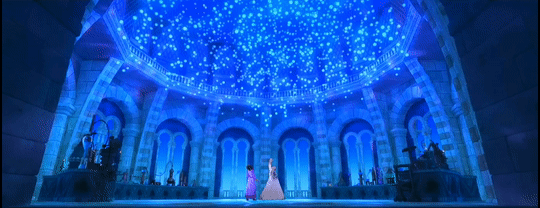
Overall Grade: C-
76 notes
·
View notes
Text
thinking a lot about wildbow's early works (worm, pact) and his more recent moralistic works (ward, pale) and the sheer difference in narrative empathy
in worm and pact you have characters who do fucked up things but it feels like a lot of effort is put into understanding the people behind them and where they're coming from. rachel's dogs maul people but there's a whole Arc of taylor learning to vibe with her and befriend her and of rachel getting what she needs (a place alone with her dogs where she can let other people in at her own pace) and growing as a person. all from the angle of 'this is genuinely good for rachel and helpful'. we want her to succeed because we care about her.
in pact we see how sandra duchamp grew up, how she's just as much a victim of her family as she is someone who perpetuates that harm, and while she's an antagonist the story doesn't spoonfeed it to us--we're allowed to see her human and sympathetic moments and we're allowed to feel bad for her while also wanting her stopped.
it felt. i don't know. like the story in general respected these characters, respected the reader's ability to empathize with those characters while also knowing Murder Bad or whatever.
but then the major worm fandom interpretations shifted. you had reddit and other popular sources going on about how taylor was actually horrible and an unreliable narrator, and how the undersiders were actually ~super fucked up and evil criminals~. pact and twig were spared this for the most part by virtue of being less popular with those crowds.
and i'm not sure if the morality discourse got baked into wildbow's brain by osmosis or if he felt like he wouldn't be appeasing his fandom if he didn't address it or what.
but by ward suddenly that narrative empathy, for the most part, is missing. it becomes conditional -- the protagonist and others do not extend empathy towards others until they Properly Recognize What They've Done Wrong. any improvement, any attempt to do better isn't legitimate unless the Bad Deeds are addressed and atoned for by whatever inconsistent standards the narrative adheres to. what matters isn't riley being in a healthier place and making connections--ward thinks that we should be rooting for riley because she recognizes she messed up and is constantly making up for the atrocities she committed.
i think it's kind of reached its peak in post arc 13 pale though. every time empathy is extended it's near-always accompanied by a patronizing little reminder of "mmmm, well you did Bad Things too".
you aren't allowed to just say "well damn i sympathize with charles", for example, because the narrative constantly reminds you that actually he is Still Doing Bad and therefore you aren't allowed to feel for him. it doesn't help that the story continually one-ups itself on thinking of ways to make charles over the top evil either.
but either way it's just. bleak. in a story purportedly about community building it's shockingly uncaring. you can't just sympathize with a morally grey character or take them As They Are without the story casting judgment and constantly reminding you of their verdict. it's just exhausting and makes any positive message the story tries to send feel hollow
OBLIGATORY NOTE: this essay does not mean "actually all fallen and e88 and etc should be empathized with". what it does mean is that in a moralistic work it becomes telling when ex-nazi rune gets her own interlude and a bunch of pagetime to show how she's 'doing better' while that same courtesy isn't extended to many villains who are traumatized and might have, say, legitimate reasons to not want to be arrested or feel like they have no other option, or legitimate reason to not support the heroes, but oh. they do Crimes so actually none of that matters as long as they're still Doing Crimes.
#parahumans#wildbow#uhhh this discusses every web serial except for twig p much so general spoiler warnings ig#also keep in mind this is about characters who werent created from the get go to be pure antagonists#its fine to just have characters who are evil. sometimes people just suck#but theres a difference between that and the story going 'actually your circumstances and any nuance doesn't matter because you suck'
169 notes
·
View notes